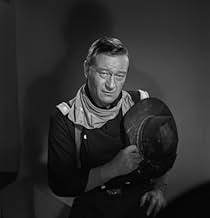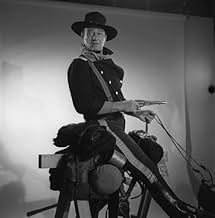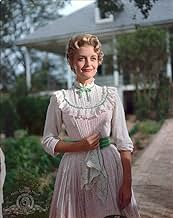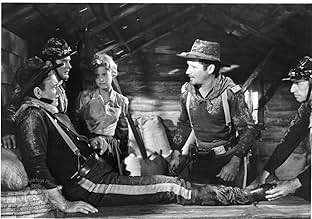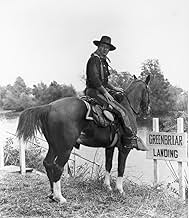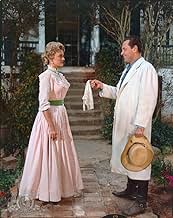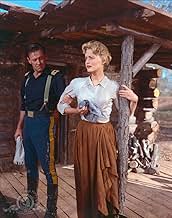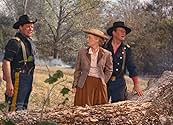IMDb RATING
7.1/10
13K
YOUR RATING
In 1863, a Union outfit is sent behind Confederate lines in Mississippi to destroy enemy railroads but a captive southern belle and the unit's doctor cause frictions within ranks.In 1863, a Union outfit is sent behind Confederate lines in Mississippi to destroy enemy railroads but a captive southern belle and the unit's doctor cause frictions within ranks.In 1863, a Union outfit is sent behind Confederate lines in Mississippi to destroy enemy railroads but a captive southern belle and the unit's doctor cause frictions within ranks.
- Director
- Writers
- Stars
- Awards
- 1 nomination total
- Director
- Writers
- All cast & crew
- Production, box office & more at IMDbPro
Featured reviews
John Ford probably did more to glorify the old American Cavalry of the 19th Century than any other major Hollywood Director. But while the Civil War is an element that keeps turning up in his movies, he never actually did do the Civil War film he wanted to do - a biography of the career of Ulysses Grant. In his career he tackled the Civil War three times.
In PRISONER OF SHARK ISLAND he dealt with the story of Dr.Samuel Mudd, who was sentenced to life imprisonment for involvement in Lincoln's Assassination. In HOW THE WEST WAS WON, Ford did the segment dealing with the battle of "SHILOH", with Harry Morgan as General Grant and John Wayne as General Sherman. This film was the nearest that Ford ever got to his dream film. THE HORSE SOLDIERS was the only film that was devoted to a full study of the effect of the war in the South, on both Union and Rebel soldiers. While not, perhaps, the best that Ford could have achieved - he was in the twilight of his master career - it is a fine film none-the-less.
The story is based on an incident in 1863 known as Grierson's Raid. Cavalry leader Benjamin Grierson was sent by Grant into Alabama and Mississippi on a raid to attack a railway junction, supposedly to destroy it for strategic reasons. While it was important to knock the railway junction out of effective work, the real purpose was to tie up Confederate forces in these backwaters. Since December 1862 Grant was struggling to capture the city of Vicksburg, Mississippi, the last major Confederate stronghold on the Mississippi River. But try as he did Grant kept losing to the Confederates under Joseph Johnston and John C. Pemberton (the commander in Vicksburg). But Grant had noticed how Confederate cavalry men like Earl Van Dorn and Nathan Bedford Forrest had forced him to use men to protect his supply lines, and took valuable time away from him trying to fight off or track them down. He decided that Grierson, a first rate Cavalry leader, could do the same thing to Johnston. A very intelligent Confederate Commander, Johnston was nervous at unexpected difficulties. Grant reasoned that Grierson's men would panic Johnston, and cause him to waste time chasing him down.
As it turned out Grierson's Raid worked. The pinning down of large numbers of Rebel troops in Alabama and Missisippi was wonderful for Grant's Vicksburg campaign. It was the beginning of the successful conclusion of the campaign, as Johnston's attention was now split between trying to help support Pemberton and trying to reassure frightened southern populations in the hinterlands. Grierson got most of his men back to Northern lines. Vicksburg was able to hold out until July 4, 1863. It's fall (the day after Lee's defeat at Gettysburg) really marked the beginning of the end of the Civil War.
This incident is the basis for THE HORSE SOLDIERS. Ford concentrates on what the experience of the war must have been like in the Southern countryside. Certain things are taken from other incidents and battlefields. When a military school's cadets are brought into the field to try to catch or slow down John Wayne's men, Ford is really picking up on an incident in the war in Virginia, when the young cadets at the Virginia Military Institute came out to fight the Union troops under Sheridan in 1864. One can forgive the transition of the incident.
It has been pointed out that one of the characters, Colonel Secord (Willis Bouchey) is a splendid type - the political officer. Men like Secord (usually in the position of General) bedeviled both sides, because of their usually normal level of mediocrity or idiocy. A few rose to the job well - the best of the Northern political generals was "Black Jack" Logan, who would be a valuable associate of Sherman in the battles around Atlanta. But for every positive General Logan, there were thieves like Benjamin "Spoons" Butler, who feathered his nest as military governor of New Orleans (he supposedly stole even the silver spoons of the citizenry). Actually Secord is normally intelligent, and follows Wayne's strategy. But he is constantly looking ahead at post-war elections. Towards the end he even wonders if the White House beckons.
Another lovely moment shows the fraying of the Southern cause. Wayne and his men come across two Rebel deserters (Strother Martin and Denver Pyle) who have tied up the local sheriff (Russell Simpson). Wayne thanks Martin and Pyle for their unofficial assistance to the Northern cause,telling them which way they plan to go. While Martin chatters away (mentioning the strength of Rebel forces in the area), Wayne carefully knocks out Pyle and then Martin, and then unties Simpson and assists in tying up the two deserters. William Holden is watching this, and later asks why he helped Simpson. Wayne explains that he decided to feed the deserters false information about his own movements, as they would probably give the information to the Confederates later on anyway.
All the performances are fine, with Wayne in particular as a man who hates doctors and medicine for a valid personal reason. Holden is in a subordinate role but he gets some nice moments. So does Constance Towers, in a rare leading part, as a passionate Confederate supporter who gradually gets to like Wayne. Carleton Young, as a former friend of Wayne, has a moment trying to rally Confederate forces at the railway depot.
It is a good Ford film, and makes one wish that Ford had made his Ulysses Grant biography.
In PRISONER OF SHARK ISLAND he dealt with the story of Dr.Samuel Mudd, who was sentenced to life imprisonment for involvement in Lincoln's Assassination. In HOW THE WEST WAS WON, Ford did the segment dealing with the battle of "SHILOH", with Harry Morgan as General Grant and John Wayne as General Sherman. This film was the nearest that Ford ever got to his dream film. THE HORSE SOLDIERS was the only film that was devoted to a full study of the effect of the war in the South, on both Union and Rebel soldiers. While not, perhaps, the best that Ford could have achieved - he was in the twilight of his master career - it is a fine film none-the-less.
The story is based on an incident in 1863 known as Grierson's Raid. Cavalry leader Benjamin Grierson was sent by Grant into Alabama and Mississippi on a raid to attack a railway junction, supposedly to destroy it for strategic reasons. While it was important to knock the railway junction out of effective work, the real purpose was to tie up Confederate forces in these backwaters. Since December 1862 Grant was struggling to capture the city of Vicksburg, Mississippi, the last major Confederate stronghold on the Mississippi River. But try as he did Grant kept losing to the Confederates under Joseph Johnston and John C. Pemberton (the commander in Vicksburg). But Grant had noticed how Confederate cavalry men like Earl Van Dorn and Nathan Bedford Forrest had forced him to use men to protect his supply lines, and took valuable time away from him trying to fight off or track them down. He decided that Grierson, a first rate Cavalry leader, could do the same thing to Johnston. A very intelligent Confederate Commander, Johnston was nervous at unexpected difficulties. Grant reasoned that Grierson's men would panic Johnston, and cause him to waste time chasing him down.
As it turned out Grierson's Raid worked. The pinning down of large numbers of Rebel troops in Alabama and Missisippi was wonderful for Grant's Vicksburg campaign. It was the beginning of the successful conclusion of the campaign, as Johnston's attention was now split between trying to help support Pemberton and trying to reassure frightened southern populations in the hinterlands. Grierson got most of his men back to Northern lines. Vicksburg was able to hold out until July 4, 1863. It's fall (the day after Lee's defeat at Gettysburg) really marked the beginning of the end of the Civil War.
This incident is the basis for THE HORSE SOLDIERS. Ford concentrates on what the experience of the war must have been like in the Southern countryside. Certain things are taken from other incidents and battlefields. When a military school's cadets are brought into the field to try to catch or slow down John Wayne's men, Ford is really picking up on an incident in the war in Virginia, when the young cadets at the Virginia Military Institute came out to fight the Union troops under Sheridan in 1864. One can forgive the transition of the incident.
It has been pointed out that one of the characters, Colonel Secord (Willis Bouchey) is a splendid type - the political officer. Men like Secord (usually in the position of General) bedeviled both sides, because of their usually normal level of mediocrity or idiocy. A few rose to the job well - the best of the Northern political generals was "Black Jack" Logan, who would be a valuable associate of Sherman in the battles around Atlanta. But for every positive General Logan, there were thieves like Benjamin "Spoons" Butler, who feathered his nest as military governor of New Orleans (he supposedly stole even the silver spoons of the citizenry). Actually Secord is normally intelligent, and follows Wayne's strategy. But he is constantly looking ahead at post-war elections. Towards the end he even wonders if the White House beckons.
Another lovely moment shows the fraying of the Southern cause. Wayne and his men come across two Rebel deserters (Strother Martin and Denver Pyle) who have tied up the local sheriff (Russell Simpson). Wayne thanks Martin and Pyle for their unofficial assistance to the Northern cause,telling them which way they plan to go. While Martin chatters away (mentioning the strength of Rebel forces in the area), Wayne carefully knocks out Pyle and then Martin, and then unties Simpson and assists in tying up the two deserters. William Holden is watching this, and later asks why he helped Simpson. Wayne explains that he decided to feed the deserters false information about his own movements, as they would probably give the information to the Confederates later on anyway.
All the performances are fine, with Wayne in particular as a man who hates doctors and medicine for a valid personal reason. Holden is in a subordinate role but he gets some nice moments. So does Constance Towers, in a rare leading part, as a passionate Confederate supporter who gradually gets to like Wayne. Carleton Young, as a former friend of Wayne, has a moment trying to rally Confederate forces at the railway depot.
It is a good Ford film, and makes one wish that Ford had made his Ulysses Grant biography.
Director John Ford was notably sentimental about the actors and crew who had worked with him over the years in his film 'family.' Among these was an old stunt man and western wrangler, Fred Kennedy. Against his better judgment, Ford gave Kennedy a stunt ride in "The Horse Soldiers." Kennedy's horse fell, breaking the old actor's neck. The scene was retained in the final cut. But Ford was broken-hearted with guilt.
This film has the usual Hollywood-style errors about the Civil War -- men talking about Andersonville Prison months before it was established, minor diversions treated as the pivotal event of a campaign, that sort of thing. The biggest error though was the replacement of the fascinating Colonel Ben Grierson with Wayne's railroad man character. Grierson was a music teacher who was afraid of horses because one kicked him in the head as a child. Joining the Union army to fight slavery (he was a staunch abolitionist) he wanted infantry duty but was assigned to the cavalry by mistake. He turned out to be good at it and stayed in the cavalry after the war, becoming the first Colonel of the 10th Cavalry (Buffalo soldiers). It'd have been nice to see Grierson on screen.
Historical inaccuracy aside though the movie did quite well. The film showed multiple viewpoints and a fair degree of respect for most of them. It showed aspects of the war that were generally ignored in other films of the period -- the bloody horror of battlefield amputations, the desire of people to give up on the whole thing (I can't think of an earlier film that talked about deserters and the way they disrupted the southern home front), and the pain of the sheer physical destruction of the war -- a pain that affected the destroyers as well as the victims, something Gone With the Wind never quite admitted.
Some posters have complained about southern belle Hannah Hunter's overuse of sex appeal to spy on Union soldiers -- while there was no historical Hannah Hunter there were plenty of southern women who did just that, including Belle Boyd, Rose Greenhow and others. Some posters have complained about the way the film trivializes slavery -- this is unfair. It underplays slavery but never trivializes it. It shows conflicts within the Union army about the institution and addresses the issue of personal loyalty between some slaves and masters without glamorizing the institution as a whole. Does the film go far enough by modern standards? No. But it goes much farther than its contemporary and treats the slavery issue more honestly than modern travesties like Gods And Generals.
One poster actually complained about how inaccurate southern snipers were -- this is completely unfair. There was no indication that the "snipers" were specially trained men with Whitworth rifles or anything like that. They looked more like ordinary troopers out skirmishing, or perhaps the even more poorly trained militia. Ordinary soldiers fired more than 100 rounds for every hit they scored, so poor shooting on either side is nothing to be surprised about.
8 out of 10
Historical inaccuracy aside though the movie did quite well. The film showed multiple viewpoints and a fair degree of respect for most of them. It showed aspects of the war that were generally ignored in other films of the period -- the bloody horror of battlefield amputations, the desire of people to give up on the whole thing (I can't think of an earlier film that talked about deserters and the way they disrupted the southern home front), and the pain of the sheer physical destruction of the war -- a pain that affected the destroyers as well as the victims, something Gone With the Wind never quite admitted.
Some posters have complained about southern belle Hannah Hunter's overuse of sex appeal to spy on Union soldiers -- while there was no historical Hannah Hunter there were plenty of southern women who did just that, including Belle Boyd, Rose Greenhow and others. Some posters have complained about the way the film trivializes slavery -- this is unfair. It underplays slavery but never trivializes it. It shows conflicts within the Union army about the institution and addresses the issue of personal loyalty between some slaves and masters without glamorizing the institution as a whole. Does the film go far enough by modern standards? No. But it goes much farther than its contemporary and treats the slavery issue more honestly than modern travesties like Gods And Generals.
One poster actually complained about how inaccurate southern snipers were -- this is completely unfair. There was no indication that the "snipers" were specially trained men with Whitworth rifles or anything like that. They looked more like ordinary troopers out skirmishing, or perhaps the even more poorly trained militia. Ordinary soldiers fired more than 100 rounds for every hit they scored, so poor shooting on either side is nothing to be surprised about.
8 out of 10
I have high praise for THE HORSE SOLDIERS, an absorbing, excellent Civil War movie about the Union cavalry during combat and based on some actual battles according to historians. The only flaw seems to be the casting of Constance Towers as the flirtatious, spirited Southern lady who becomes the unwilling captive of Col. John Marlowe (John Wayne) when he discovers that she is a Confederate spy. She goes along for the ride and provides the film's love interest. While she's certainly a capable enough actress, it's the sort of role that cries for a hot-tempered Maureen O'Hara who must have been busy in another role to pass up this choice romantic lead.
It's the sort of Ford film that must have been hard on the actors, riding through swamps on horseback and engaging in fierce battles when pursued by Rebel forces. William Holden has some wonderful moments as a doctor who is constantly bickering with John Wayne. Their exchanges provide plenty of tension and humor--and both actors are at their best under Ford's direction.
A good Civil War western combining magnificent photography, good performances and some rousing battle scenes. The horrors of war are not ignored and there are some sentimental moments that never strike a false note.
It's the sort of Ford film that must have been hard on the actors, riding through swamps on horseback and engaging in fierce battles when pursued by Rebel forces. William Holden has some wonderful moments as a doctor who is constantly bickering with John Wayne. Their exchanges provide plenty of tension and humor--and both actors are at their best under Ford's direction.
A good Civil War western combining magnificent photography, good performances and some rousing battle scenes. The horrors of war are not ignored and there are some sentimental moments that never strike a false note.
General critical consensus seems to feel that John Ford's The Horse Soldiers is a bit of a let-down, at least by the dizzyingly high standards of the director. However, it's quite liberating if you try to forget that you're watching a John Ford movie and just treat it as an American Civil War movie like any other. Then, the film's qualities become more apparent. Yes, The Horse Soldiers is inferior to many of the other John Ford movies. But Ford working at half-speed is still better than most directors working at the peak of their powers. And The Horse Soldiers is still a fascinating, exciting and expertly told war film.
Colonel John Marlowe (John Wayne) is ordered by the Union generals to lead his army 300 miles into the Confederacy, where they are to sabotage and disrupt the vital railway supply town of Newton Station as much as possible. After a disastrous few months of lost battles and heavy casualties, the Union generals are determined to swing the battle back in their favour before the arrival of winter. Marlowe is unhappy to learn that his orders include allowing army surgeon Major Kendall (William Holden) along on the mission. Since the death of his wife at the hands of two blundering surgeons, Marlowe has had little respect for those in the medical profession. To further complicate matters, a feisty Southern belle, Hannah Hunter (Constance Towers) with Confederate sympathies, overhears Marlowe informing his men that Newton Station is the target, and that once the town has been raided the Union forces plan to head for the safety of Baton Rouge. In order to secure her silence, Marlowe has to take her prisoner and suffer her sharp Southern tongue (plus escape attempts) during the trip.
The Horse Soldiers is filmed in loving detail, with gorgeous autumnal backdrops. Its story is very interesting, especially the volatile relationship between Wayne and Holden, and the mission itself provides excitements along the way. In particular, a street battle at Newton Station is memorable, as is a scene later in the film when the Union soldiers come under attack from an army of Confederate army cadets still at schoolboy age. Towers' character is written as a very cunning and feisty woman, who disguises her attributes by coming across as a melodramatic, gossipy airhead. Towers plays the part well, but because of how she's encouraged to handle the role she becomes rather irritating too. One disappointing moment in the film comes when Wayne and Holden reach breaking-point with each other and ride off to a secluded glade to slug it out. The sequence is set to be a real humdinger, but is curiously cut short by the arrival of the enemy forces. On the whole, though, The Horse Soldiers is a good, solid Civil War entertainment, well worth a look.
Colonel John Marlowe (John Wayne) is ordered by the Union generals to lead his army 300 miles into the Confederacy, where they are to sabotage and disrupt the vital railway supply town of Newton Station as much as possible. After a disastrous few months of lost battles and heavy casualties, the Union generals are determined to swing the battle back in their favour before the arrival of winter. Marlowe is unhappy to learn that his orders include allowing army surgeon Major Kendall (William Holden) along on the mission. Since the death of his wife at the hands of two blundering surgeons, Marlowe has had little respect for those in the medical profession. To further complicate matters, a feisty Southern belle, Hannah Hunter (Constance Towers) with Confederate sympathies, overhears Marlowe informing his men that Newton Station is the target, and that once the town has been raided the Union forces plan to head for the safety of Baton Rouge. In order to secure her silence, Marlowe has to take her prisoner and suffer her sharp Southern tongue (plus escape attempts) during the trip.
The Horse Soldiers is filmed in loving detail, with gorgeous autumnal backdrops. Its story is very interesting, especially the volatile relationship between Wayne and Holden, and the mission itself provides excitements along the way. In particular, a street battle at Newton Station is memorable, as is a scene later in the film when the Union soldiers come under attack from an army of Confederate army cadets still at schoolboy age. Towers' character is written as a very cunning and feisty woman, who disguises her attributes by coming across as a melodramatic, gossipy airhead. Towers plays the part well, but because of how she's encouraged to handle the role she becomes rather irritating too. One disappointing moment in the film comes when Wayne and Holden reach breaking-point with each other and ride off to a secluded glade to slug it out. The sequence is set to be a real humdinger, but is curiously cut short by the arrival of the enemy forces. On the whole, though, The Horse Soldiers is a good, solid Civil War entertainment, well worth a look.
Did you know
- TriviaThe film marked the beginning of mega-deals for Hollywood stars. John Wayne and William Holden received $775,000 each, plus 20% of the overall profits, an unheard-of sum for that time. The final contract involved six companies and numbered twice the pages of the movie's script. The film, however, was a financial failure, with no profits to be shared in the end.
- GoofsIn the shot right after Hank Worden throws the torch onto the cotton bales, look at the upper left of the screen. You will see an airplane flying from right to left.
- Quotes
Miss Hannah Hunter: [bending over with a plate of chicken, revealing ample cleavage] Do you prefer the leg... or the breast?
Col. John Marlowe: I've had quite enough of both, thank you.
- ConnectionsFeatured in Directed by John Ford (1971)
- SoundtracksI Left My Love
by Stan Jones
- How long is The Horse Soldiers?Powered by Alexa
Details
Box office
- Gross US & Canada
- $1,753,526
- Runtime
- 2h(120 min)
Contribute to this page
Suggest an edit or add missing content


